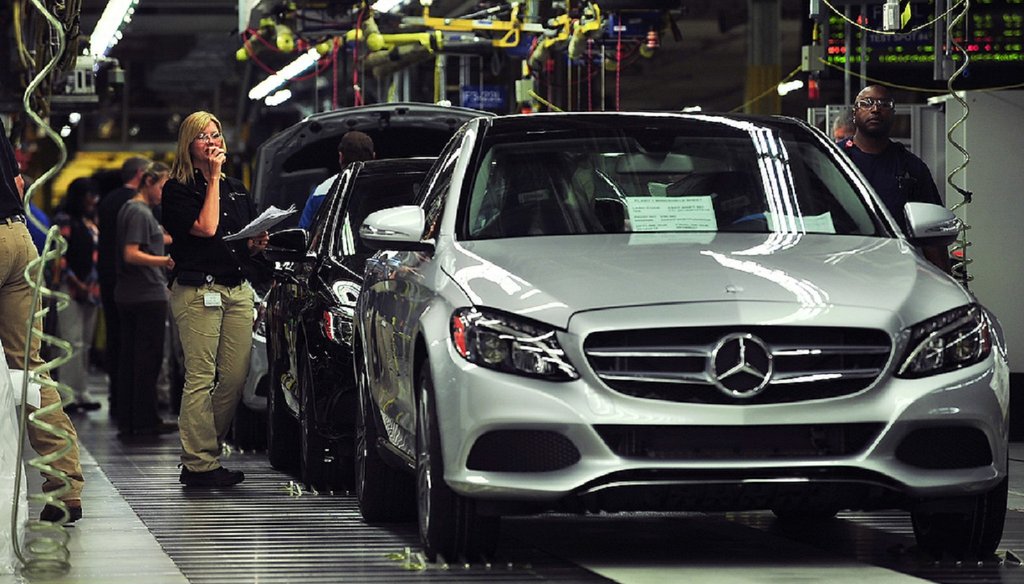Stand up for the facts!
Our only agenda is to publish the truth so you can be an informed participant in democracy.
We need your help.
I would like to contribute

Workers produce C-Class sedans at the Mercedes plant near Tuscaloosa, Ala. The German automaker is moving its U.S. headquarters to metro Atlanta. Photo by Tamika Moore/AL.com, via Associated Press
The recent announcement that Mercedes-Benz USA will move its corporate headquarters to metro Atlanta State was big news in a state still struggling with unemployment.
The headquarters will bring with it at least 800 jobs – some relocated, some new – at a time when Georgia’s unemployment rate has stubbornly trailed the nation. In November, Georgia had a 7.2 unemployment rate, compared to 5.8 percent nationally.
State officials are talking about other challenges and state economics that play into those statistics, and PolitiFact Georgia has been vetting some of the claims.
Among them:
Looking at Georgia’s skills gap
University system Chancellor Hank Huckaby made note of Georgia’s uphill climb to remake its workforce in a recent civic club speech in Valdosta.
Only 42 percent of young Georgians have a college certificate or degree, but soon 60 percent of jobs will require some college credential, he said.
The first statistic comes from a report from the nonprofit Complete College of America and researchers at Georgetown University's Center on Education and the Workforce.
The report found Georgia with a 27 percent skills gap based on forecasts that 61 percent of the state's jobs in 2020 would require a career certificate or college degree and, at the time, only 34 percent of Georgia adults had an associate degree or higher.
The claim that just 42 percent of Georgians had college experience was based on a 2011 analysis from the University System of Georgia and the National Center for Higher Education Management Systems.
That research calculated that 20.9 percent of Georgians had bachelor's degrees; 8.2 percent had graduate or professional degrees; 6.7 percent had associate degrees; and 6.6 percent had certificates from college programs that were at least one year, but less than two years.
Taken together, the reports back up Huckaby’s statistics and show the gap needed to graduate more students from Georgia’s colleges and universities. We rated his statement True.
What is Georgia’s biggest industry?
Political leaders and farm groups have long claimed agriculture is Georgia’s biggest industry.
In 2011, according to the Georgia Farm Bureau, agriculture was the largest sector, contributing $71 billion to the state economy.
PolitiFact Georgia found the statistic comes from an annual report from the Center for Agribusiness and Economic Development at the University of Georgia.
That report adds both the direct economic value of agriculture with supply-chain businesses, such as fertilizer, and first-line processing plants. It then multiplies what workers in all of those jobs spend on daily living, to arrive at the $71 billion figure, or about 10 percent of the state’s economy.
The caveat, according to economists, is that the number is simply a snapshot of the current slice of the pie that agriculture represents.
It does not measure the impact of agriculture. That means the state could cut back on agriculture subsidies, for instance, without it necessarily having a 10 percent impact on the economy.
Only a separate, different economic analysis could determine agriculture’s importance. But the claim is accurate if looking at only what agriculture and ag-related businesses spend and contribute in one year. We rated the claim Mostly True.
Our Sources
See individual reports.
















































